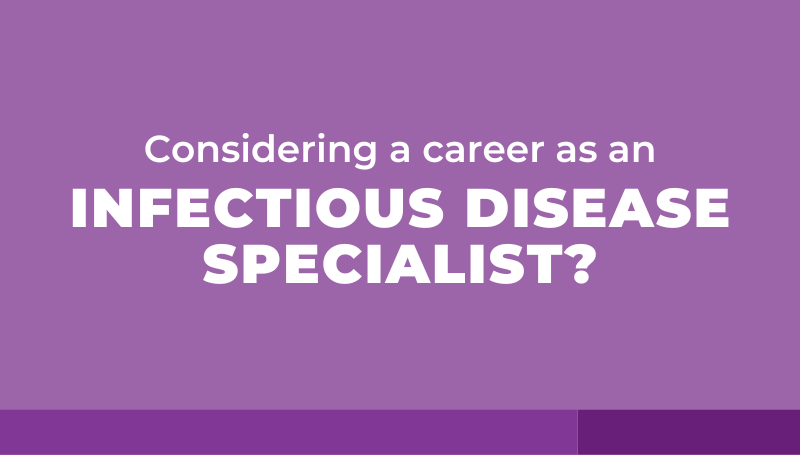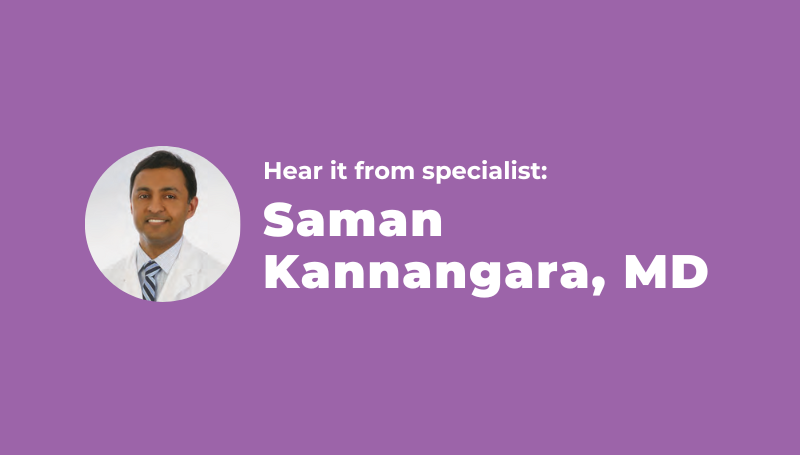
Key points:
- Patients are referred to infectious disease specialists because their infections are complicated and may require more specialized treatment than a PCP can provide.
- Becoming an infectious disease specialist will take 13-14 years, including undergraduate education, medical school, residency and fellowship.
- The average Infectious Disease Physician salary in the United States is $237,319 as of 2022.
- Detail-oriented people excel as infectious disease specialists, especially those who enjoy the detective work of diagnosing a specific infection.
Choosing which specialty you'll go into is one of the biggest decisions you'll ever make. If you're thinking about becoming an infectious disease specialist, here are the top things you'll need to know before entering the field. We interviewed infectious disease specialist, Saman Kannangara, MD, to bring you all the details on what he likes best about his specialty, and what personality types excel within this specialty.
What Do Infectious Disease Specialists Do?
Infectious disease specialists treat adults and children who present with various types of infections. Patients are often referred to infectious disease specialists because their infections are severe, complicated, or recurrent and may require more specialized testing and treatment than the primary care or referring physician can provide.
Adult infectious disease specialists treat both inpatients and outpatients. Inpatient consultations can include evaluations of fever, leukocytosis, urinary tract infections, skin and soft-tissue infections, Clostridium difficile infections, pulmonary infections, bone and joint infections, and postoperative infections. Outpatient visits can involve the management of human immunodeficiency virus infections, hepatitis, Lyme disease, and endocarditis, as well as hospital follow-up visits and travel medicine.
Pediatric infectious disease specialists likewise treat both inpatients and outpatients. They can treat patients with immunodeficiency syndromes and neonatal, congenital, or other infections, including skin and soft-tissue infections, bone and joint infections, urinary tract infections, and pulmonary infections. They ensure children of all ages receive appropriate diagnostic testing and treatment.
How to Become an Infectious Disease Specialist
To become an infectious disease specialist, you'll need to receive an undergraduate degree and complete all prerequisite course to apply to your desired medical school as well as take the Medical College Admissions Test (MCAT).
The next step to become an infectious disease specialist is to apply for and attend a Doctor of Medicine (MD) or Doctor of Osteopathic Medicine (DO) program and become a physician. During this time you'll need to take United States Medical Licensing Examinations (USMLE) or United States Comprehensive Osteopathic Medical Licensing Examinations (COMLEX) depending on if you're in an MD or DO program.
After medical school, you'll need to apply and match into a residency program. The training required for pediatric infectious disease specialists includes a residency in pediatrics (3 year residency program) followed by a fellowship in pediatric infectious diseases (generally another 3 years of training). The training required for adult infectious disease specialists includes a residency in internal medicine (3 year residency program) followed by a fellowship in infectious diseases (generally another 2-3 years of training). You can then take your board certification exam/exams.
How Many Years Does It Take To Become an Infectious Disease Specialist?
To become an infectious disease specialist, you'll need to complete 4 years of undergraduate education, 4 years of traditional med school education, and then varying lengths of residency and fellowship training depending on if you'd like to specialize in adult or pediatric infectious disease. So, all in all, becoming an infectious disease specialist will take 13-14 years.
How Much Do Infectious Disease Specialists Make?
According to Salary.com, the average Infectious Disease Physician salary in the United States is $237,319 as of 2022, but the range typically falls between $205,394 and $275,632. Of course, salaries range depending on experience, education, and location.

Career Focus: Infectious Disease section in the Medical Student Core
On the best aspects of being an infectious disease specialist
"My favorite aspect of the infectious disease specialty is that it involves all systems of the body and allows for interaction with most other medical fields. There is great variety in the types of infections we see. For example, we often manage skin, bone and joint, lung, and human immunodeficiency virus infections, endocarditis, hepatitis, and Lyme disease." - Saman Kannangara, MD
On the hardest parts of being an infectious disease specialist
"Sometimes it can be frustrating and challenging to evaluate conditions such as fevers and leukocytosis because they can have multiple (and occasionally noninfectious) etiologies." - Saman Kannangara, MD
On personality types that generally excel in infectious disease
"Detail-oriented people excel in this field, especially those who enjoy the detective work of diagnosing a specific infection. The field of infectious diseases often requires obtaining detailed histories, performing thorough physical examinations, and carefully reviewing laboratory, culture, and imaging results." - Saman Kannangara, MD
Related content:
- 7 Things to Know Before You Become a Neurologist
- How to Become an OB/GYN Doctor
- How Do I Become a Surgeon? Here’s What You Need to Know
- How Do I Become a Dermatologist? Here’s What You Need to Know


